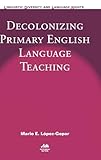Decolonizing Primary English Language Teaching / Mario E. López-Gopar.
Material type: TextSeries: Linguistic Diversity and Language RightsPublisher: Bristol ; Blue Ridge Summit : Multilingual Matters, [2016]Copyright date: ©2016Description: 1 online resourceContent type:
TextSeries: Linguistic Diversity and Language RightsPublisher: Bristol ; Blue Ridge Summit : Multilingual Matters, [2016]Copyright date: ©2016Description: 1 online resourceContent type: - 9781783095766
- 9781783095773
- 372.6521097274 23
- PE1129.S8 L56 2016
- online - DeGruyter
- Issued also in print.
| Item type | Current library | Call number | URL | Status | Notes | Barcode | |
|---|---|---|---|---|---|---|---|
 eBook
eBook
|
Biblioteca "Angelicum" Pont. Univ. S.Tommaso d'Aquino Nuvola online | online - DeGruyter (Browse shelf(Opens below)) | Online access | Not for loan (Accesso limitato) | Accesso per gli utenti autorizzati / Access for authorized users | (dgr)9781783095773 |
Frontmatter -- Contents -- Figures and Tables -- Acknowledgements -- Foreword -- 1. Decolonizing Primary English Language Teaching (PELT) -- 2. Indigenous Peoples and English in Mexico -- 3. Los de la Banda (The Gang Members) -- 4. The Children -- 5. Language Practices and Ideologies -- 6. Praxicum and Change -- 7. Student Teachers and Children as Authors and Language Subjects -- 8. Decolonizing PELT: Grounded Principles -- References -- Index
restricted access online access with authorization star
http://purl.org/coar/access_right/c_16ec
This book tells the story of a project in Mexico which aimed to decolonize primary English teaching by building on research that suggests Indigenous students are struggling in educational systems and are discriminated against by the mainstream. Led by their instructor, a group of student teachers aspired to challenge the apparent world phenomenon that associates English with "progress" and make English work in favor of Indigenous and othered children's ways of being. The book uses stories as well as multimodality in the form of photos and videos to demonstrate how the English language can be used to open a dialogue with children about language ideologies. The approach helps to support minoritized and Indigenous languages and the development of respect for linguistic human rights worldwide.
Issued also in print.
Mode of access: Internet via World Wide Web.
In English.
Description based on online resource; title from PDF title page (publisher's Web site, viewed 24. Apr 2022)


